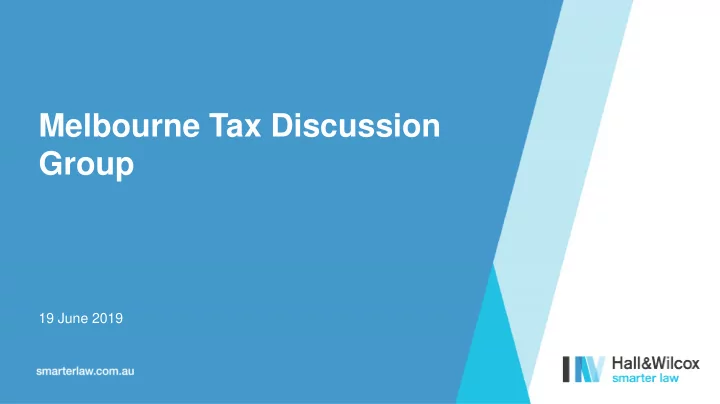

Melbourne Tax Discussion Group 19 June 2019
Taxation of Cryptocurrencies
What is blockchain?
What is blockchain? Public v private Decentralised network Consensus protocols (e.g. Proof of Work, Proof of Stake) Smart contracts Token economies Tokens incentivise spending and certain behaviour within the token economy – native token/cryptocurrency and utility token DAOs and dApps
Why is blockchain important? https://steemit.com/kr/@powerguy/the-blockchain-ecosystem-map-v3-0
What are cryptocurrencies? First wave of blockchain technology Useful case studies: Benefits and limits of blockchain technology Whether traditional tax principles are fit for purpose
What are cryptocurrencies? Pure digital cash – Is bitcoin money? ATO says no Medium of exchange (declining acceptance by merchants but could this change?) Store of value (means of increasing wealth rather than maintaining wealth) Unit of account (volatility doesn’t lend itself to meeting this element)
What are cryptocurrencies? Digital tokens Stable – fiat-collateralized, crypto-collateralized, non-collateralized Utility Security Sovereign
Application of traditional tax principles to cryptocurrency Scenario Revenue CGT Buy and hold for < 12 months , Buy and hold for > 12 months access to 50% CGT discount Buy with intention to hold for > 12 months, but then sell within 12 months Acquire and use for personal use personal use asset exemption Exchange arbitrage
Application of traditional tax principles to cryptocurrency Hard forks Impact Tax issues - Original cryptocurrency • No impact? If held on revenue account: • Split or changed? • Do facts support apportionment of original crypto cost of acquisition? If held on capital account: • Do facts support apportionment of original crypto cost base? - New cryptocurrency • Receipt of new crypto for Revenue or capital receipt? no consideration, from If revenue receipt: code managed by a • Assessable on MV of new crypto decentralized network of If capital receipt: miners • Is CGT Event H2 triggered? • What is MV of new crypto? • Does MV substitution rule apply to cost base of new crypto – meaning of ‘entity’
Application of traditional tax principles to ICOs – Basic ICO framework Revenue Capital Pre- • Initial costs: • s 8-1, 40-455, 40-880? • CGT cost base of •Developers, legal and accounting, marketing • Acquisition cost of tokens •Token economics (supply limit, burn rate, etc) ICO tokens? • R&D Tax Incentive? Tokens • Allocate cost of • CGT Event D1? • Legal and beneficial ownership? acquisition/producing created • Value of tokens at time of creation? tokens ICO • Profit-making scheme • CGT Event A1? • Ordinary business • Investors send crypto consideration to issuer period income derived (if no refunds) Post- • Tokens released to investor wallets • Assessable gains / • Capital gains/losses deductible losses • Gains/losses on conversion of crypto consideration to AUD ICO • Some tokens retained by ICO team for various purposes KEY MESSAGE: Consider tax outcomes of ICO to manage mismatches (timing, rev/cap) and cash tax
GST issues GST definition of “digital currency” is out of date GST registrations How are multi-characteristic tokens treated (e.g. attributes of security token and utility token) Other issues
Treasury review into ICOs and tokens “Personal use” wallet election for individual token holders “De minimis” exemption for individual token holders Clarity on the tax treatment of airdrops Call for administratively binding guidance from the ATO (rather than web guidance) Call for introduction of statutory organisation to oversee Australian blockchain projects over a certain period to better understand potential of technology and impact to Australian industries and economy
ATO cryptocurrency data matching protocol Protocol will span from FY15 to FY19 income years A key is to identify taxpayers that have not complied with their tax obligations Businesses that accept cryptocurrency as payment for goods and services, or that are paying staff in cryptocurrency, need to ensure they are aware of the guidance published by the ATO about the tax treatment of cryptocurrency used in business Cryptocurrency trading businesses will need to ensure they are applying the trading stock rules correctly. In large part, many individuals would be viewed as carrying on a cryptocurrency trading business as a sole trader. Just because a business of cryptocurrency trading is going on, it does not necessarily mean that all of the cryptocurrency is held as trading stock. In some cases, the cryptocurrency holdings are better characterised as held like cash at bank, or held as an investment (and subject to the capital gains tax rules).
Disclaimer The comments in this presentation are intended as high level comments rather than advice. This presentation is not to be used or relied upon as a substitute for comprehensive professional advice. Before acting on any matter in this area, you should discuss your situation with a suitably qualified professional adviser.
Recommend
More recommend